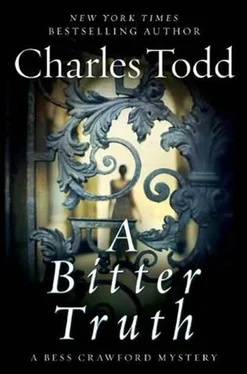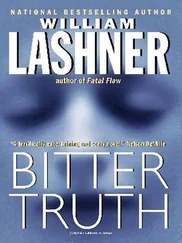It was another week before I could take the few days coming to me and find a lift to Calais. An officer, a Major Fielding, was carrying dispatches to be sent on to London, something to do with ordnance, and as I got down near the harbor, he said, “Do you drive, Sister Crawford?”
“Yes, sir, I do.”
“Then keep the motorcar, will you? I’ll be back from London in three days and I’d like to find it here whole, not commandeered or stripped of parts badly needed elsewhere. It’s my own motorcar, you see.”
“Thank you, sir! I’ll take good care of it.”
“See that you do. And meet me here on the dot of noon in three days’ time.”
I saw him off and gratefully turned the motorcar to go in search of the house where the nuns had taken shelter after leaving their convent on the road to Ypres.
Easier said than done. When I stopped a French priest and asked him where to look, he shrugged in that Gallic expression of ignorance.
“What can I say, Sister. There are so many houses dispossessed by this war. But if you go to the church two streets over, the one whose tower is visible from here, they may be able to help you.”
And so I found myself in the office of the monsignor of St. Catherine’s Church.
He was a thin man, prematurely aged by war and responsibility, but he took time to listen to me.
I showed him my list, courtesy of the Australian Sergeant, and he scanned it quickly.
“You permit?” he asked, pen poised over the sheet of paper. When I nodded, he began to make notes. “This house had only six elderly nuns,” he said, “And this one is now in Rouen, but I don’t know if they have orphans in their care. Their duty before the war was to the sick, much like yourself, and in particular, the care of the elderly and aged, many of whom have nowhere else to go. This next house is also in Rouen, and it may be the one you seek. But I make no promises. This and this and this house are now scattered.” He shrugged again. “Alas, I have no way of knowing where the rest may be. We are endeavoring to keep up with the displacement of religious houses, but there are so many, and I am one man.”
As I thanked him for his assistance, he asked, “What is your business with this child you seek?”
“I don’t know,” I told him truthfully. “But it’s a charge I was given, to find her and make certain that she is safe.”
“Is the child’s mother French?”
“I was told that she was. Which is why the child is in an orphanage. The father, we believe he is an English officer, didn’t know that the mother of the child died, and by the time he discovered that, she was already in this orphanage or another like it.”
“And why is he not seeking this child himself?”
“I have reason to believe that he is. But France is wide, and one child is hard to find.”
“And you do not know how this child is called?”
“If I did,” I said, “it would make my task easier. But I do know what she looks like, and if I see her, it’s possible that I will recognize her.”
He considered me for a moment. “There was someone here also searching for a small child. I was not in Calais, you understand, and my housekeeper told this Englishman, an officer, that we could not help him. She was suspicious, you see. She did not think he was”-he looked for the right word-“ ‘ so frantic as a father should be, if his child was missing. ’ ”
“Does she remember when this Englishman came-and what he looked like?”
“It was three weeks ago. I know, because I was in Lille at the time.”
Then it wasn’t George Hughes, trying to discover where the nuns at the convent on the Ypres road had gone. It had to be Roger Ellis.
… so frantic as a father should be, if his child was missing.
“Why then was he searching for the little girl?” I asked, curious.
“I have no idea.” He smiled. “She is afraid, Madame Buvet, that he would take the child to England and rear her as a heretic.”
“Is that so terrible, if she is loved and given a proper home?”
“In the mind of my housekeeper, better an orphan than a heretic.”
“But you have helped me.”
“You are a nursing sister. I believe that you are concerned for the welfare of this little girl.”
“And if the English officer comes again?”
“I shall judge him for myself. And then I shall decide what is best to do.”
I thanked him again, and went out to the motorcar. Three private soldiers from a Yorkshire regiment had lifted the bonnet, and when I appeared, they quickly lowered it again. “Sister,” they said, almost in unison, coming smartly to attention. “May we turn the crank for you?” one of them asked.
I could see then why Major Fielding had feared for the safety of his transport. I was pleased to find that the motor did turn over and nothing appeared to be missing as I drove on.
It was not far to Rouen, as a French crow might fly. But given the heavy traffic of military vehicles and the condition of the roads, I didn’t arrive in the city until well after midnight. For a mercy the town was quiet. The Base Hospital in the old race course was brightly lit, but the motor ambulance convoys, lorries, and omnibuses bringing in the wounded were thin on the ground with the lull in the fighting. Even the trains that brought in many of the wounded were idle. The raw recruits had already marched up from the River Seine and found their billets for the night. No one had the energy to fill the bistros and the corner wine shops at this hour.
This English Base Hospital for the wounded was manned by American doctors and nurses, filling in the decimated ranks of English medical men. Indeed, the shortage had become acute. I’d sent patients to them from the advanced dressing stations and knew that they did good work. But I never quite understood why the permanent buildings at the course had been turned into offices and the wounded were housed in tents.
Ever mindful of the fact that I must return to meet Major Fielding in one more day’s time, I knocked at the door of a house on Rue des Champignons that an elderly gendarme had directed me to in the maze of half-timbered housing in an older quarter near the river.
The sleepy nun acting as porter opened the small peephole in the door and peered out at me. “What do you want of us at this hour, Mademoiselle?” she asked in French heavily accented by the Breton tongue.
“I’m an English nursing sister,” I said, for that she could see for herself. “I’ve come to ask if you have children here, orphans. We treated several children some time ago, and I wish to be certain that they are no longer in need of care.”
“You are from the Base Hospital? But we have no children here, Sister. There is no space for the little ones. We have only the aged and the dying.”
Disappointed, I asked, “But did you have children at one time? There was a very young nun who brought them to me. I’m sorry I don’t remember her name.”
“We have no young nuns here. You must be mistaken. But we did have thirteen children at one time.”
“And where are they now?”
“Here in Rouen.” And she gave me the direction of another house, this one on the Rue St. Jean.
I thanked her and drove on. In the dark, it was very difficult to find this particular house. It was south of the cathedral, and as I crossed the Place in front of it, I looked up at the great west front, the lacey stonework and niches so heavily shadowed in the starlight that they were almost sinister, the faces of the saints dark and unreadable. Above my head, the three great towers were stark against the night sky, the iron tower at the center almost lost in the blackness of the night.
The house I was looking for was on a back street in a quarter that a century ago had been prosperous, the buildings huddled cheek by jowl with their neighbors, as if for comfort and support. Still, it was large enough to accommodate several nuns and their charges.
Читать дальше












